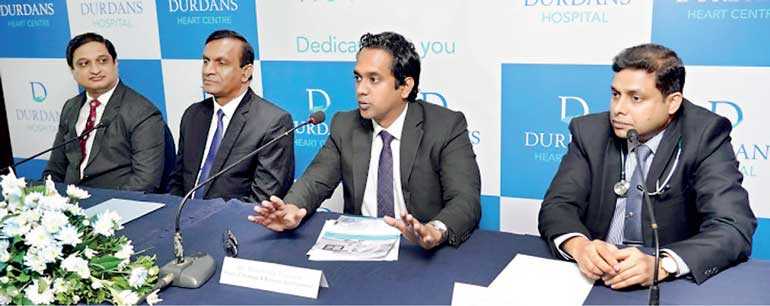Wednesday Feb 18, 2026
Wednesday Feb 18, 2026
Wednesday, 13 June 2018 09:00 - - {{hitsCtrl.values.hits}}

From left: Consultant Radiologist Dr. Adithya Salgado, Medical Services Director Dr. Wimal Karandagoda, Head of Strategy and Business Development Rakshitha Tudawe and Consultant Interventional Cardiologist Dr. Pandula Athauda-arachchi
– Pic by Upul Abaysasekara
By Safna Malik
Durdans Hospital recently announced the opening of the most advanced biplane catheterisation laboratory which helps interventionists cure and treat complex conditions easily. The latest Philips Azurion biplane offers high accuracy through user friendly software and allows clinicians to use time efficiently to treat patients.
Introducing the advanced biplane catheterisation laboratory at the press conference held last week, Durdans Hospital Director Medical Services Dr. Wimal Karandagoda stated that Durdans Hospital has made major investments of around $ 1.3 million to carry out most advanced hi-tech procedures from Netherlands.
The advanced biplane catheterisation laboratory consists of cardiac procedures, live imaging and navigation platforms, and it can facilitate more accurate navigation inside the vessels and better guide precise device placement procedures.
These platforms can also benefit sophisticated catheter and ablation techniques for cardiac procedures that require advanced imaging. In stent procedures the platform can aid the right sized stent to be placed in the right location.
One of the significant aspects of the advanced biplane catheterisation laboratory is radiation controlling and managing tool. This can be achieved with high visible images at low X-ray dose through ClarityIQ technology. The Image Guided Therapy Platform offers highly visible images that can reveal minute details at low X-ray dose.
The use of minimally invasive surgical procedures has grown rapidly in recent years, not only in radiology but also in fields including cardiology, oncology, and vascular surgery. Minimally invasive technology has even given rise to a whole new hospital segment, the hybrid operating room (OR), that includes imaging devices to enable surgeons to use either traditional or minimally invasive techniques.
Durdans Hospital Consultant Radiologist Dr. Adithya Salgado explained that a hi-tech interventional tool built into the biplane such as VasoCT is an advanced interventional tool to assist neuroradiologists with stroke treatment in the interventional X-ray lab. It helps to identify and assess the size and extent of an occlusion in the case of an ischemic stroke; it will enable interventionists to see detailed images of soft tissues and blood vessels and if an aneurysm is caused by weakened blood vessel wall or may be a result of a hereditary condition it will be now easily accessible through Aneurysm Flow tool which can enhance decision-making through superior visualisation and quantification of information and it also offers live imaging high safety brain surgeries guiding a greater use of minimally invasive techniques, as brain vessels are highly complex.
“We are the first to have advanced Biplane Catheterisation in South Asia and I’m proud about it,” he said.
Salgado also mentioned this new advanced system has the possibility of multiple procedures such as a heart catheterisation procedure as well as vascular interventions can be performed in the same operating room which makes it safer for patient and is very convenient for the interventionist too.
“We are the first in the South Asian region to have advanced Biplane Catheterisation laboratory in Sri Lanka,” he added.